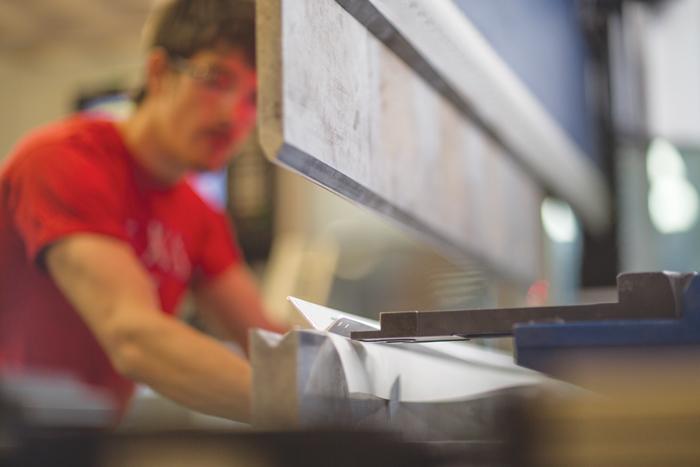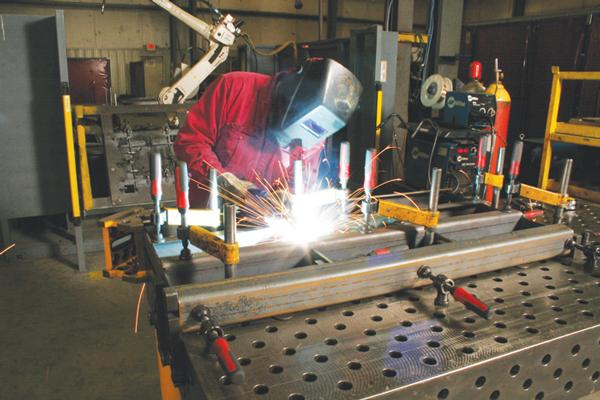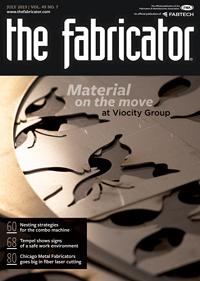Senior Editor
- FMA
- The Fabricator
- FABTECH
- Canadian Metalworking
Categories
- Additive Manufacturing
- Aluminum Welding
- Arc Welding
- Assembly and Joining
- Automation and Robotics
- Bending and Forming
- Consumables
- Cutting and Weld Prep
- Electric Vehicles
- En Español
- Finishing
- Hydroforming
- Laser Cutting
- Laser Welding
- Machining
- Manufacturing Software
- Materials Handling
- Metals/Materials
- Oxyfuel Cutting
- Plasma Cutting
- Power Tools
- Punching and Other Holemaking
- Roll Forming
- Safety
- Sawing
- Shearing
- Shop Management
- Testing and Measuring
- Tube and Pipe Fabrication
- Tube and Pipe Production
- Waterjet Cutting
Industry Directory
Webcasts
Podcasts
FAB 40
Advertise
Subscribe
Account Login
Search
The customer relationship benefits of scaling up
How Anchor Partners is scaling up its metal fabrication processes through calculated manufacturing investments
- By Tim Heston
- July 10, 2019
- Article
- Shop Management

An operator at Anchor Fabrication forms a cosmetically sensitive workpiece. Different companies within the Anchor Partners organization share capacities and capabilities (like brakes with specific tonnage capacities), often winning work that individual companies wouldn’t be able to do alone.
Metal fabrication is dominated by private businesses, many of them family-owned—or, at the very least, run like a family. Walk into a custom fabricator almost anywhere in the country, and you often get the impression that the employees have known each other forever. It’s part of what gives this business its refreshingly unpretentious character. It’s why people come to work every day, and it’s why some would never dream of leaving.
That said, not every family owner has kin that want to take over. The founder’s children might like certain aspects of the business—perhaps solving engineering- or machinery-related problems—but might have no interest in leadership. Or they might choose a different path—not an outlandish decision, considering the effects of globalization and the changes manufacturing’s been through after the 2001 and 2009 recessions. So what then? Succession planning can get tricky.
This is why Tra Willbanks launched Southlake, Texas-based Anchor Partners.
A Family Office Focused on Metal Fab
Willbanks grew up in this industry, working for his father at Fort Worth, Texas-based Anchor Fabrication. His dad retired in 2006, and Willbanks eventually acquired the business in 2011.
“I’m an accountant by trade,” Willbanks said, “but I also worked on the floor. I saw plenty of opportunities in our operations, but then I started looking out geographically.”
He saw that many businesses in this sector looked a lot like Anchor, but they also had owners who weren’t going to work forever. “I built on the wonderful foundation [my dad] gave me,” Willbanks said, adding that “my dad had a better succession plan than others. But I also realized that there are many who don’t have any succession plan.”
So he began looking for potential acquisitions, including family businesses. Willbanks made the first few acquisitions on the strength of Anchor Fabrication’s balance sheet. This included Abby Manufacturing, a company near Memphis that focuses on medium- to small-scale metal fabrication. But to grow more, Willbanks knew he’d need outside investors.
“We eventually found people who were willing to partner with us from a capital standpoint,” Willbanks said, “and that allowed us to execute on our strategy.”
Formed in August 2018, Anchor Partners purchased Anchor Fabrication; Abby Manufacturing; as well as Mandeville, La.-based BOH Environmental, which makes and distributes field pack-up (FPU) systems used for logistics in various industries. Although the companies are in very different businesses, “from a manufacturing standpoint they complement each other in unique ways,” Willbanks said, adding that Anchor isn’t solely tied to metal fabrication. “We’re always on the lookout for complementary businesses.”
Anchor Partners most recently made headlines earlier this year when it acquired Quality Industries, a large custom fabricator and stamping operation in La Vergne, Tenn. Willbanks remembers meeting Quality’s family owners in 2003 during an industry event.
In 2010 Anchor Fabrication collaborated with Quality on a project. “They really let me see behind the scenes,” Willbanks recalled, “and ever since then, they have been on our short list. About a year ago the family stepped up the process of looking to sell.” By September 2018 the negotiations began in earnest, and the deal closed Feb. 28. After the acquisition, Anchor Partners now employs more than 1,000 people across all its companies.
Quality Industries checked all of Anchor Partners’ boxes. It was in the Southeast, a growing area for metal fabrication. It was heavy into Class A and heavy industrial trucking. And it had a variety of sheet metal and plate processing capabilities, including laser cutting and punching, bending, welding, and extensive stamping. “The company just has a great customer base, great equipment, a great management team,” Willbanks said, “and they blend very well with a lot of what we’re trying to do.”
The Challenges of Custom Fabrication
As an accountant and investor who grew up in custom metal fabrication and knows his way around the shop floor, Willbanks has an unusual skill set. He knows this business, and he knows how acquisitions can add value. But it’s not a straightforward business by any stretch.
Anchor Partners is a family office—financial jargon for a family-controlled investment group—and it looks for strategic investments, both long-term and, if the right buyer were to come forth, short-term.
“If you read Warren Buffett’s most recent letter to his shareholders, you might recall the line where he says that finding businesses with good management teams is very difficult. And when you do find one, you need to hang on to it,” Willbanks said. “And I’ll tell you that, overall, that’s our approach.”
The metal fabrication business is ever-changing. Most fabricators serve customers that have some manufacturing capability, and they work with sourcing managers who are looking to make their own operations more efficient while getting the most out of their supply chain.
“Rightly so, customers are constantly looking for ways to produce for less,” Willbanks said, “and that sometimes means bringing more fabrication capabilities in-house. It can be challenging in this business to create a sticky relationship with your customer.
“At the same time, you have market saturation in some areas,” Willbanks continued. “A guy down the street puts in a laser and now makes it a little cheaper than you do.
“And finally, you have the commodities. A fabricator is subjected to what happens in the steel market. So in 2018 the price of steel went up by 60 percent. That just increased the amount of cash that’s required to run the business.”
Combine this with the fact that metal fabrication is capital-intensive, requiring big machinery and software purchases, and then it becomes obvious: “There’s a reason you won’t find many successful private equity players in this space,” Willbanks said. “Anyone with a checkbook can buy a business, right? The hard part is running them.”
The Opportunities
What exactly attracts Willbanks (or anyone else, for that matter) to this business? It might sound a little counterintuitive, but the very aspects that make this business so challenging—the high capital requirements, customer turnover, tight competition—also open up some big opportunities. It goes back to customer stickiness.
“I like this business because there are ways to create stickiness with customers,” Willbanks said, “and there are efficiencies when you start scaling up.” That said, the scaling up part can be quite difficult. “How many fabricators get above $20 million in annual revenue? Not many.”
Because of the dynamic nature of the business, combined with the high capital requirements, leapfrogging to the next revenue level can be quite difficult. Consider the FAB 40 in the June issue, a list that provides a statistical slice of the custom metal fabrication market. The revenue numbers are tightly packed until shops reach about $25 million in annual sales; above that, the gaps between reported revenue numbers widen; and above $100 million, there just aren’t that many players.
Here, Willbanks said, is where the acquisition approach can make sense. Scale has obvious benefits for purchasing, of particular interest considering the tumultuous materials market over the past year. Willbanks said that as a baseline the Anchor Partners businesses try to keep inventory as lean as they can. Anchor Fabrication, for instance, turns its inventory about 16 times a year.
“We spend a lot of money on steel, obviously. A lot of times our customers want to buy from a particular source, so we’ll comply with that. But overall, we’re constantly looking for ways to drive cost out of the steel side of the business.” The most significant benefits tend to come with the diverse processing capabilities in a portfolio of several companies. “For example, consider Abby has a customer that has a job requiring a 1,000-ton press brake. Abby, which focuses on smaller fabrications, doesn’t go out and buy a huge brake. So we’ll look at the shipping costs and consider moving the product to Fort Worth [to Anchor Fabrication]. We have the capacity, so we can ship it out from here.” Eventually it might make sense for Abby to buy a large brake, but that will depend on how that job and related jobs evolve. And taking that large-brake job also could lead to other jobs that Abby could fulfill with its own equipment. This, Willbanks explains, builds customer stickiness and helps foster what could be a long-term customer relationship. But if Abby didn’t have the ability to use Anchor Fabrication’s large-brake capacity, it never would have considered taking the job in the first place.About Information
How would Anchor or Abby know when to make the investment, or collaborate on a job, or share capacity, or do any number of things that could help a customer succeed—and, in so doing, increase that customer stickiness? It comes down to having the right information, which can become even more powerful as an organization scales up. “There’s data and there’s information,” Willbanks explained. “Data is just a compilation of facts, of ones and zeros. Information is pulling the data so you can make a decision based on it. There’s a big difference.” Operationally, Willbanks said that the company is using this data to standardize its processes using the 80-20 rule, a useful tool in the custom fabrication arena. About 80 percent of the processes the company uses to interact with customers can be standardized, while about 20 percent needs to be customized to meet a customer’s specific needs. This works particularly well when defining thresholds for decision-making. If a process or situation falls within the 80 percent, decision-making can be “pushed down” in the organization so that the person interacting with a customer can make the decision and move forward. “To make this happen, we have a way in which we disseminate data in an informative way so people can make decisions. This helps us speed up the business everywhere we go. That is, we look at how long it takes us between ‘order in’ and ‘order out,’ and we speed it up. And we have a specific process that we go through to make sure that information is made available to everyone in the organization.” How exactly does this work? Willbanks paused and chuckled quietly. “I played golf last week at a well-known club, and someone told a story about Phil Mickelson being the only guy able to make a hole from a back bunker. A reporter asked him how he did it. And he said, ‘I’d tell you, but if I did, the chairman of this club would change something about the hole so it’d make it impossible for me to make it.’” In other words, informational intelligence is a key part of Anchor’s secret sauce. The sauce isn’t based solely on machines’ cutting, bending, or welding capability—though that’s a necessary ingredient. It’s the informational intelligence that gives the sauce some kick. The information helps Anchor Partners companies make customers’ lives easier and builds customer stickiness. That stickiness gives the secret sauce real staying power.About the Author

Tim Heston
2135 Point Blvd
Elgin, IL 60123
815-381-1314
Tim Heston, The Fabricator's senior editor, has covered the metal fabrication industry since 1998, starting his career at the American Welding Society's Welding Journal. Since then he has covered the full range of metal fabrication processes, from stamping, bending, and cutting to grinding and polishing. He joined The Fabricator's staff in October 2007.
subscribe now

The Fabricator is North America's leading magazine for the metal forming and fabricating industry. The magazine delivers the news, technical articles, and case histories that enable fabricators to do their jobs more efficiently. The Fabricator has served the industry since 1970.
start your free subscription- Stay connected from anywhere

Easily access valuable industry resources now with full access to the digital edition of The Fabricator.

Easily access valuable industry resources now with full access to the digital edition of The Welder.

Easily access valuable industry resources now with full access to the digital edition of The Tube and Pipe Journal.
- Podcasting
- Podcast:
- The Fabricator Podcast
- Published:
- 04/16/2024
- Running Time:
- 63:29
In this episode of The Fabricator Podcast, Caleb Chamberlain, co-founder and CEO of OSH Cut, discusses his company’s...
- Industry Events
16th Annual Safety Conference
- April 30 - May 1, 2024
- Elgin,
Pipe and Tube Conference
- May 21 - 22, 2024
- Omaha, NE
World-Class Roll Forming Workshop
- June 5 - 6, 2024
- Louisville, KY
Advanced Laser Application Workshop
- June 25 - 27, 2024
- Novi, MI
































